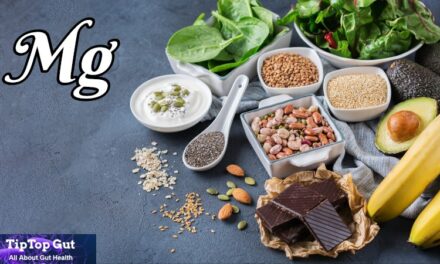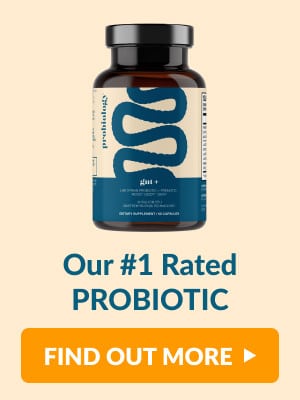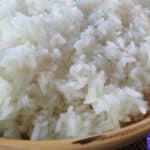Since ancient times, many people in East Asia have loved and eaten Kimchi, the national cuisine of Korea. It is well renowned for having a spicy flavor and is frequently the star of a side dish that includes other vegetables.
Kimchi has excellent health benefits despite being a frequent condiment. Typically, vegetables like cabbage and radishes are fermented to create Kimchi. Here, you’re going to explore, “is kimchi good for gut health?”
How to Make Kimchi?
It is made by immersing the veggies in a brine that helps preserve them by drawing out their fluids. To retain the desired flavor, fermentation with lactic bacteria is used. Since Kimchi is fermented, it tastes sour and salty.
Kimchi is a type of Korean slaw that uses salt and fermentation to preserve the veggies in a manner akin to pickling. Most frequently, cabbage and one or more varieties of radishes are used to make Kimchi. Along with Korean root vegetables and herbs, additional typical ingredients could include celery, spinach, carrot, onion, or cucumber.
Spice is another aspect of Kimchi that is frequently noted. The recipe may use several spices, but Kimchi’s most famous traditional ingredients are ginger, garlic, sugar, Korean red pepper, sugar, and onion powder. Fish sauces or salty fish paste are frequently used when cooking Kimchi and add taste and saltiness to the dish.
Kimchi Nutrition Information
- Calcium – 33 mg
- Carbohydrates 2.4 g
- Energy- 15 Kcal
- Iron – 2.5 mg.
- Magnesium – 14 mg
- Fiber – 1.6 g
- Protein 1.1g
- Potassium – 151 mg
- Vitamin B6 – 0.213 mg
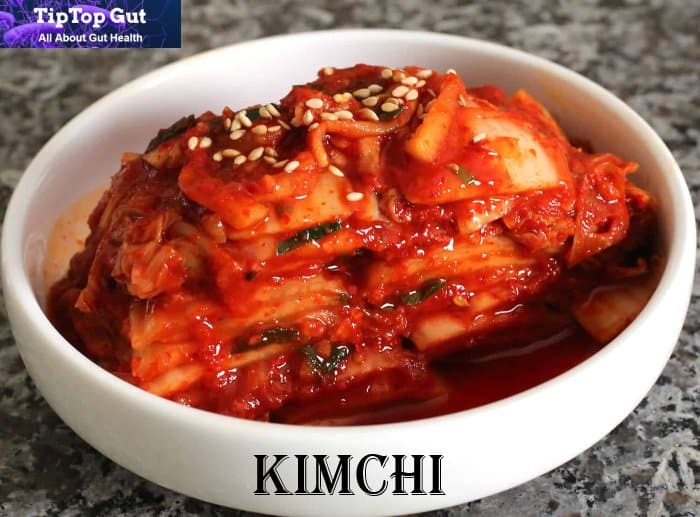
Read More:
60 Best Foods for Gut Health and Digestion: The Best Guide You Ever Need!
Is Kimchi Good for Gut Health?
Yes, as a good source of probiotics, Kimchi is good for gut health that has many health advantages. According to research, eating more foods like Kimchi may enhance bowel function, strengthen your immune system, and help restore the balance of microbes in your gut.
Probiotics can also be used to treat the symptoms of irritable bowel syndrome (IBS), a chronic digestive disorder that includes gas, diarrhea, constipation, and abdominal pain.
Kimchi Health Benefits
Kimchi is a bowl of glutinous rice, seafood, and vegetable-based hot and sour Korean cuisine. This cuisine is renowned for its beneficial effects on health, which include lowering inflammation, preventing diabetes, and enhancing heart health. The following are the most critical kimchi health benefits:
Kimchi Boosts Gut Health
Vital data suggests that the fermented food kimchi can boost immunity by enhancing the well-being of beneficial bacteria. Additionally, consuming fermented foods enhances your digestive system’s health, easing constipation. The probiotics in gut-friendly foods like Kimchi are well recognized. Probiotics are microorganisms that can enhance your gut health and benefit your body’s general health.
Like other fermented vegetables and meals, Kimchi is loaded with healthy bacteria known as probiotics, which have been linked to various health advantages, all of which begin in the digestive system.
According to Alissa Rumsey, RD, nutritionist and proprietor of Alissa Rumsey Nutrition and Wellness, eating Kimchi can help balance the bacteria in your stomach, ultimately assisting your gut health by promoting easy digestion.
Kimchi May Enhance your Brain Health
A little kimchi may be good for the brain. Its ingredients can lessen inflammation and oxidative stress while facilitating clearer thinking.
Kimchi May Strengthen Your Immune System
Your immune system benefits from Kimchi’s digestive properties as well. Since most of the immune function occurs in the gut, Kimchi’s probiotics are advantageous for immunological health. Your immune system performs more effectively when your gut microbiota is healthy.
Kimchi Helps to Reduce Cholesterol Levels
Your cholesterol can be reduced by eating Kimchi with garlic. Additionally, allicin and selenium, contained in garlic, help you indirectly by decreasing plaque buildup in your arteries. Additionally, this would help avoid heart disease or strokes with tremendous success.
Healthy Eyesight with Kimchi
18% of your daily vitamin A needs are met by consuming 100 grams of Kimchi. Antioxidant vitamin A can aid in the removal of cancer-causing free radicals. Vitamin A has many health and physical benefits, but it’s also critical for keeping visual clarity and a healthy embryo.
Kimchi is Suitable for Hair and Skin
By maintaining good skin and hair with the selenium present in garlic, Kimchi helps to prevent wrinkles. Additionally, Kimchi contains:
- Selenium.
- A vital component of glutathione.
- Enhancing its potency and effectiveness in the body.
Eating Kimchi is excellent for your skin because it prevents age spots and restores a youthful radiance.
Kimchi Avoids Gastric Cancer
Carrots and kimchi aid in the removal of toxic substances. Additionally, Kimchi contains radish and cabbage, which have biochemicals that can aid in the removal of heavy metals. These specific bio-chemicals have been proven in studies to prevent stomach cancer.
Stops Peptic Ulcers
In the stomach, stomach ulcers are brought on by Helicobacter pylori. Leuconostoc mesenteroides, found in Kimchi, make dextrin, which prevents ulcers from arising by feeding the stomach bacterium H. pylori.
Yeast Infections May be Avoided with Kimchi
According to research, specific strains of the beneficial bacteria present in Kimchi may possess the antibacterial abilities to combat fungi that cause yeast infections, lowering the risk of contracting the infection.
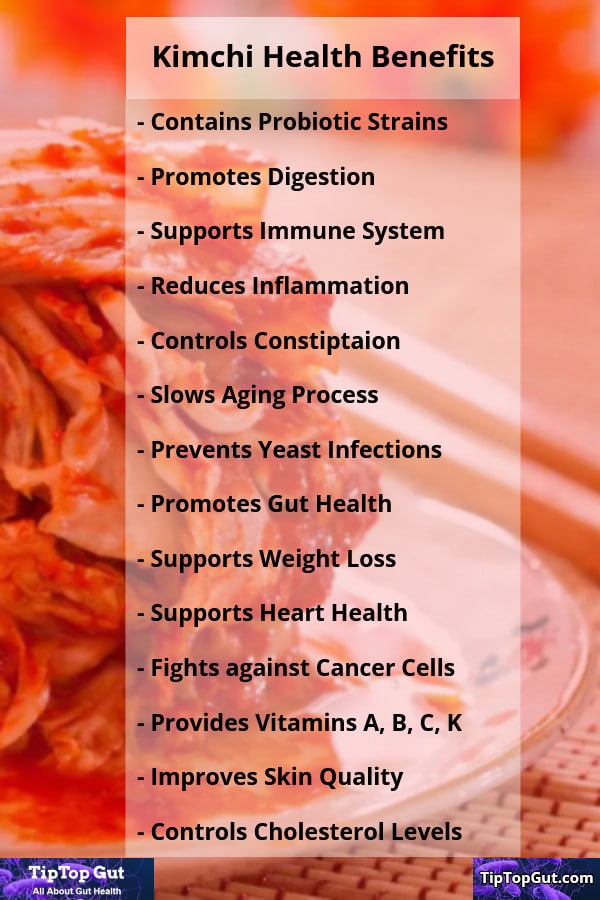
How Frequently Should You Consume Kimchi?
Probiotics and helpful bacteria must be frequently taken for Kimchi’s health advantages to be felt. One serving (100g) of Kimchi daily is advised because “regular” can mean many different things to different people. This advice is solely intended to help you gain the most health advantages from consumption.
How to Pair Kimchi with Other Dishes
The Korean delicacy Kimchi is frequently served with other Asian or Korean cuisines. Bulgogi Kimchi Pasta, a meal made by combining Bulgogi with Kimchi, is one of the most well-liked combos. As an alternative, Kimchi is frequently included in fried rice to provide a nutrient-dense meal. Other meals with Kimchi as their foundation can include:
- Bibim Guksu
- Dumplings
- Pancakes
- Sushi roll
- Udon
Alternatives of Kimchi
Several substitutes offer comparable advantages if you’ve tried Kimchi before and don’t like it. You may be familiar with sauerkraut, which is a highly similar dish. It has a similar range of health advantages to Kimchi and is frequently served with hotdogs or sausages. The flavor, devoid of spice and fermented tang, is the main distinction.
Additionally, several fermented foods don’t offer all the same advantages but are nevertheless loaded with bacteria and employed for similar digestive functions. These foods range from but are not constricted to:
You may also read; List of Fermented Foods for Gut Health: Top 11 Best Fermented Foods
Fun Facts about Kimchi
Here are some other kimchi fun facts in addition to its health benefits, which are the most mysterious:
- The first South Korean astronaut, Yi So Yeon, transported Kimchi to orbit so she could stay nourished in the demanding environment of space.
- Kimchi was first developed as early as the sixth century A.D.
- Kimchi can be stored for up to three years once it has undergone fermentation. As a result, it makes delicious non-perishable food for camping and hiking vacations.
- Annual consumption of 40–57 pounds of Kimchi is typical in Korea. Many Koreans use a separate, purpose-made refrigerator to keep their Kimchi festering all year.
- Over 200 varieties of Kimchi have been identified as having originated in Korea. Some kimchi gurus even categorize the different varieties of Kimchi into dishes that are best prepared each season.
- Don’t feel constrained by the web recipes while making your Kimchi; instead, make it to your preferences.
Concluding Now!
Kimchi is delicious! It’s packed with vitamins, minerals, and fiber. Kimchi can boost gut health, enhance brain health, help prevent cancer and even help prevent heart diseases.
Not only Kimchi has powerful antioxidant properties, but it also contains high amounts of dietary fiber. Not only does Kimchi have numerous health benefits, but it tastes delicious too!
Is Kimchi beneficial for gut health?
Yes, Kimchi is beneficial for gut health. Kimchi will strengthen your immune system, and it will also aid in restoring the balance of bacteria in your stomach.
How much quantity of Kimchi can you take regularly?
It would be best if you took probiotics and beneficial bacteria frequently to get the maximum benefits of Kimchi to work. Regular can imply many different things to various people; thus, to be more precise, it is advised that one serving (100g) of Kimchi be consumed each day.
What would happen if you consumed Kimchi daily?
The consumption of 15 to 150 grams of Kimchi daily dramatically lowered cholesterol, blood sugar, and cholesterol levels and the risk of heart disease.
Read More:
Best Over the Counter Probiotic for Gut Health: Easy Guide 2022
Best Probiotic for Gut Health and Weight Loss: An Ultimate Guide 2022
Best Probiotic for Vaginal and Gut Health: The Best Guide 2022

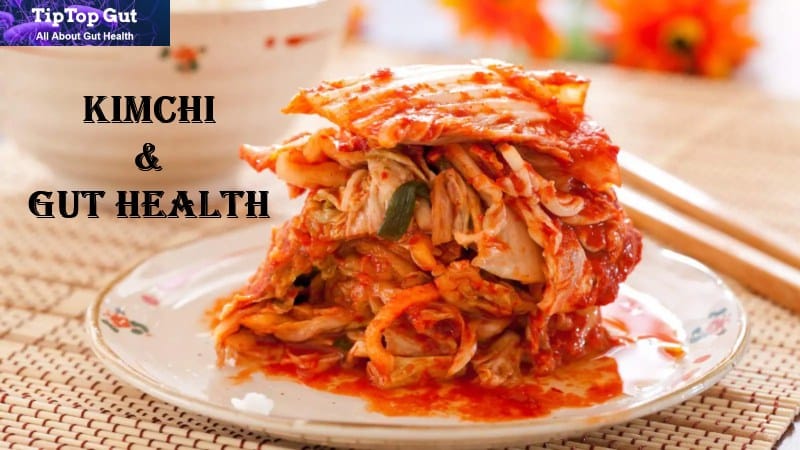


![Is Matcha Good for Gut Health? Interesting Facts Unveiled [2022]](https://tiptopgut.com/wp-content/uploads/2022/10/is-matcha-good-for-gut-health-Matcha-and-Gut-Health-TipTopGut.com_-440x264.jpg)
